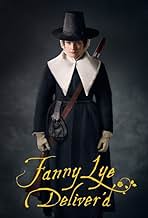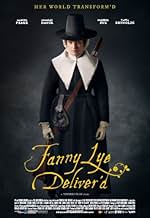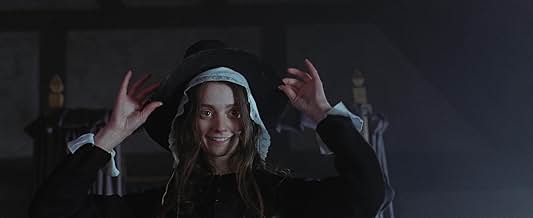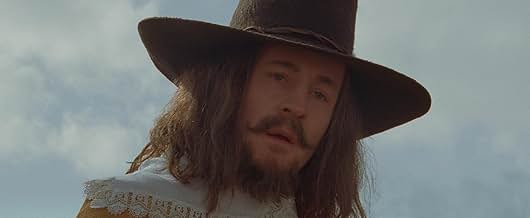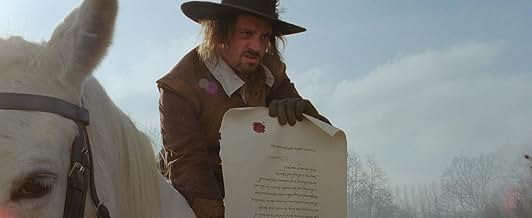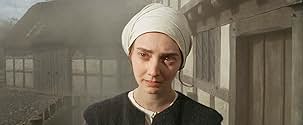Fanny Lye Deliver'd
- 2019
- 1h 52min
VALUTAZIONE IMDb
6,2/10
1976
LA TUA VALUTAZIONE
Una storia sviluppata in una fattoria isolata nello Shropshire nel 1657, dove una donna che impara a trascendere il suo matrimonio opprimente, riesce a scoprire un nuovo mondo di possibilità... Leggi tuttoUna storia sviluppata in una fattoria isolata nello Shropshire nel 1657, dove una donna che impara a trascendere il suo matrimonio opprimente, riesce a scoprire un nuovo mondo di possibilità.Una storia sviluppata in una fattoria isolata nello Shropshire nel 1657, dove una donna che impara a trascendere il suo matrimonio opprimente, riesce a scoprire un nuovo mondo di possibilità.
- Regia
- Sceneggiatura
- Star
- Premi
- 1 vittoria e 7 candidature totali
Recensioni in evidenza
A magnificent tale of a downtrodden wife and mother who is beat down by her bully, self-important husband who regularly beats both her and their little son for no reason other than he hates. He hates her, women, children who love their mother, the world, and himself. He is truly a child of his time; that time is 1657, during the cycle of English Civil Wars. One day as they arrive home to their farm from church (her husband riding the horse while she and the child walk) they find they have been invaded. A young couple has run to their secluded farm to hide out. What will the uber judgmental man of the farm do with them? This movie is not only authentic and beautifully made but it had my jaw dropping a couple of times. The cast is superb, especially that Peter McDonald as the High Sheriff for the Council of State. There isn't a sour note in the whole work.
The light that falls on John Lye's farm is diffuse, a gentle glow that passes through mist, It enters widows, softly illuminating Fanny Lye as she attends to household tasks. The imagery presented by director Thomas Clay and cinematographer Giorgos Arvanitis recalls paintings of Millet and Vermeer. While Millet's laborers sow the fields in ways suggesting contentment, and Vermeer's women appear touched by grace, the toils of Fanny (Maxine Peake) are attended by neither sentimentality nor joy.
Any sense of contentment is dispelled by an expository voice over and revelatory closeups. Fanny kneels on a hardwood floor as John lashes a switch across her back, her hands rigorously twist cloth in a wash basin. And the lovely woods and hills that surround her do not indicate an insular existence as much as an isolated one. There are no sign lines of the world beyond the stands of the trees and crests.
When youthful strangers, Thomas (Freddie Fox) and Rebecca (Tanya Reynolds) arrive, they assimilate into the family, bringing touches of levity to the Lye's young son Arthur and glimpses of liberation to Fanny. Both are interrupted by corporal punishment whenever John's notions of decorum are disturbed.
Rebecca lightens some of Fanny's burdens and Thomas emits whips of sensuality, these supported by the slow glide of Arvanitis's camera through the kitchen window to the exterior. As the fields of vision expand so, too, does the prospect of Fanny's freedom. Arvanitis also enables the audience to watch the characters like a stealthy observer, employing takes that gently pass around trees and structures to unimpeded views of the men felling trees and the women completing chores. The graceful movement of the still cam incrementally exposes challenges to John's constrictive Puritan values.
Ideologies eventually clash.
The competing perspectives, each supported by scriptural passages, struggle for dominance, the power shifting like the fortunes of the forces still fighting to control post civil war England. The battle illustrates a harsh truth: once any dogma takes control, ugly aspects of self righteousness and revenge are manifested.
In witnessing the struggle, Fanny is mostly silent as Peake's expressive face registers inner conflict, tightening at the possibility of pain for John or Arthur and relaxing at the prospect of freedom. As John, Charles Dance subtlety indicates his emotions in ways indicative of his mastery of screen acting-a slight tuck of the chin conveys disapproval, a quick blink, fear. Fox is best when his Thomas cajoles and charms, less so when he is charged with emotion. Reynolds adeptly projects both rustic ingenuousness and joyful licentiousness.
Beauty is present throughout the film. The first image of Rebecca is a closeup of her eyes, large and soft as those in a da Vinci portrait. And the pastoral beauty of the surroundings is consistently present. When violence intrudes, it plays out both suddenly and through gruesome struggle, unnerving audiences largely inured to depictions of injury and death. If Fanny's liberation is to come, barriers can be breached only by destruction and agony.
Any sense of contentment is dispelled by an expository voice over and revelatory closeups. Fanny kneels on a hardwood floor as John lashes a switch across her back, her hands rigorously twist cloth in a wash basin. And the lovely woods and hills that surround her do not indicate an insular existence as much as an isolated one. There are no sign lines of the world beyond the stands of the trees and crests.
When youthful strangers, Thomas (Freddie Fox) and Rebecca (Tanya Reynolds) arrive, they assimilate into the family, bringing touches of levity to the Lye's young son Arthur and glimpses of liberation to Fanny. Both are interrupted by corporal punishment whenever John's notions of decorum are disturbed.
Rebecca lightens some of Fanny's burdens and Thomas emits whips of sensuality, these supported by the slow glide of Arvanitis's camera through the kitchen window to the exterior. As the fields of vision expand so, too, does the prospect of Fanny's freedom. Arvanitis also enables the audience to watch the characters like a stealthy observer, employing takes that gently pass around trees and structures to unimpeded views of the men felling trees and the women completing chores. The graceful movement of the still cam incrementally exposes challenges to John's constrictive Puritan values.
Ideologies eventually clash.
The competing perspectives, each supported by scriptural passages, struggle for dominance, the power shifting like the fortunes of the forces still fighting to control post civil war England. The battle illustrates a harsh truth: once any dogma takes control, ugly aspects of self righteousness and revenge are manifested.
In witnessing the struggle, Fanny is mostly silent as Peake's expressive face registers inner conflict, tightening at the possibility of pain for John or Arthur and relaxing at the prospect of freedom. As John, Charles Dance subtlety indicates his emotions in ways indicative of his mastery of screen acting-a slight tuck of the chin conveys disapproval, a quick blink, fear. Fox is best when his Thomas cajoles and charms, less so when he is charged with emotion. Reynolds adeptly projects both rustic ingenuousness and joyful licentiousness.
Beauty is present throughout the film. The first image of Rebecca is a closeup of her eyes, large and soft as those in a da Vinci portrait. And the pastoral beauty of the surroundings is consistently present. When violence intrudes, it plays out both suddenly and through gruesome struggle, unnerving audiences largely inured to depictions of injury and death. If Fanny's liberation is to come, barriers can be breached only by destruction and agony.
A labor of love for its writer and director Thomas Clay, who spent the better part of 10 years developing this 1600's set English period folk piece; his first film since 2008's Soi Cowboy, Fanny Lye Deliver'd is an almost indescribable melting pot of drama, thriller and religiously tinged horror and while it doesn't all work, this unique piece of independent film-making is still worth your time.
Introducing us to a post war era of rural England, where witch hunts, churches and religious zealots run rampant throughout the mud-filled lands of the English countryside, Deliver'd introduces us to odd couple John and Fanny, who alongside their young boy Arthur live out a quiet existence on their farmland (custom built for this film), with their faith dominating their lives, a faith tested by the arrival of Freddie Fox's Thomas and Tanya Reynolds Rebecca, a couple who couldn't be further from the Lye's in nature and desires.
When watching clips or trailers of Clay's film one would be right in expecting something of The Witch like horror but Deliver'd is a much different beast to that genre classic and while both films share similar settings, religious/faith themed undertones and characters grappling with their teachings going head to head with their feelings, Deliver'd is a more dramatic themed feminist-centric yarn that allows its breakout performer Maxine Peake one of the roles of her increasingly impressive career.
Fanny may be the titular character of the film but it takes a while for Peake's fully formed performance to take centre stage here in what's a masterful build-up from her and Clay with Fanny undergoing significant evolution from the first time we see her tending to her chores through to her last triumphant frame and after notable turns in well-regarded if little seen offerings like Funny Cow and Peterloo, Peake is an undeniable triumph here as complicated wife, mother and independent spirit.
There's a lot going on around Fanny and Clay's film is loaded with ideas and explorations, some of which don't feel fully formed come the films more drastically pivoted final stretch but it's an unpredictable affair and one that might not make for easy viewing but remains constantly engaging throughout as we remain on edge, unsure of what lays ahead for our collection of troubled souls in equally troubled times.
Final Say -
A film that defies simple explanation or analysis, Fanny Lye Deliver'd is a confronting film and one that struggles at times to juggle its various components but its strong trope of actors and wholly original vibe makes for mostly fascinating and unpredictable viewing.
3 1/2 muddy fields out of 5
Introducing us to a post war era of rural England, where witch hunts, churches and religious zealots run rampant throughout the mud-filled lands of the English countryside, Deliver'd introduces us to odd couple John and Fanny, who alongside their young boy Arthur live out a quiet existence on their farmland (custom built for this film), with their faith dominating their lives, a faith tested by the arrival of Freddie Fox's Thomas and Tanya Reynolds Rebecca, a couple who couldn't be further from the Lye's in nature and desires.
When watching clips or trailers of Clay's film one would be right in expecting something of The Witch like horror but Deliver'd is a much different beast to that genre classic and while both films share similar settings, religious/faith themed undertones and characters grappling with their teachings going head to head with their feelings, Deliver'd is a more dramatic themed feminist-centric yarn that allows its breakout performer Maxine Peake one of the roles of her increasingly impressive career.
Fanny may be the titular character of the film but it takes a while for Peake's fully formed performance to take centre stage here in what's a masterful build-up from her and Clay with Fanny undergoing significant evolution from the first time we see her tending to her chores through to her last triumphant frame and after notable turns in well-regarded if little seen offerings like Funny Cow and Peterloo, Peake is an undeniable triumph here as complicated wife, mother and independent spirit.
There's a lot going on around Fanny and Clay's film is loaded with ideas and explorations, some of which don't feel fully formed come the films more drastically pivoted final stretch but it's an unpredictable affair and one that might not make for easy viewing but remains constantly engaging throughout as we remain on edge, unsure of what lays ahead for our collection of troubled souls in equally troubled times.
Final Say -
A film that defies simple explanation or analysis, Fanny Lye Deliver'd is a confronting film and one that struggles at times to juggle its various components but its strong trope of actors and wholly original vibe makes for mostly fascinating and unpredictable viewing.
3 1/2 muddy fields out of 5
Horrible Histories meets Hammer Horror meets Blackadder....
The basic story could have been quite good but the film is so unrealistic as to be more of a pantomime than a drama. Low budget has not allowed for getting anything dirty so all the clothes, house etc are like brand new, nothing grubby as it would obviously have been and everyone looks like they are fresh out of the shower.
The acting is surprisingly ham and the baddies are more like a comedy duo despite being evil.
All in all, a missed opportunity as could have been good with the right budget and the chance to create a realistic dark representation.
The acting is surprisingly ham and the baddies are more like a comedy duo despite being evil.
All in all, a missed opportunity as could have been good with the right budget and the chance to create a realistic dark representation.
If you live in a family that is quite strict, strangers coming from outside may feel like a welcome (pun intended) distraction. On the other hand, the father (wonderfully played here) may have the best interest in mind and heart, but his harsh and way too restricted views are not helping his wife or "kid".
The outlaws from outside really bring imbalance. Depending on your moral views, your sympathy may sway from one scene to the other. It is ok to feel, you are being given a tough choice. Morally speaking this isn't too easy - but that is what the movie gives you. Something to think about - something to chew on. And questions about what is good and what is bad, that go beyond religion and obvious answers.
Not sure why my previous comment got deleted, but while I had not saved it yet, I will park this somewhere just in case, someone feels the need to be mean - which would bring us to the characters: who is eventually the mean one? Who do you side with? Have you decided yet?
The outlaws from outside really bring imbalance. Depending on your moral views, your sympathy may sway from one scene to the other. It is ok to feel, you are being given a tough choice. Morally speaking this isn't too easy - but that is what the movie gives you. Something to think about - something to chew on. And questions about what is good and what is bad, that go beyond religion and obvious answers.
Not sure why my previous comment got deleted, but while I had not saved it yet, I will park this somewhere just in case, someone feels the need to be mean - which would bring us to the characters: who is eventually the mean one? Who do you side with? Have you decided yet?
Lo sapevi?
- QuizThe local accent in Shropshire and eastern Powys of the time was not recognisably "Welsh" or "West Midlands" in the way that might be expected today.
- BlooperAmong the linguistic anachronisms in the script are the following: Pee - to urinate: Although an old expression, the Oxford English Dictionary states that the term didn't come about until the eighteenth century, the century after this film is set. Shrooms - mushrooms with psychedelic properties: The first recorded use of this term in print was in Australia in 1977 Mixed emotions - a mid-twentieth century term describing ambivalence. Bleed out - to die due to blood loss: A twentieth century term with its origins in the United States (it is suggested that it was originally military jargon). Lose the attitude - An instruction meaning don't be rude: A late twentieth century term with its origins in the US.
- Versioni alternativeAlso exists in an Extended Cut, around 19 minutes longer than the Theatrical Cut, and currently only available through the film's 4K Ultra HD disc release in the UK. This version is the director's preferred version of the film.
- Colonne sonoreMarch to Joy
Written by Thomas Clay
Based on "Symphony No. 9" written by Ludwig van Beethoven
Heard as end theme
I più visti
Accedi per valutare e creare un elenco di titoli salvati per ottenere consigli personalizzati
- How long is The Delivered?Powered by Alexa
Dettagli
- Data di uscita
- Paesi di origine
- Siti ufficiali
- Lingua
- Celebre anche come
- The Delivered
- Luoghi delle riprese
- Aziende produttrici
- Vedi altri crediti dell’azienda su IMDbPro
Botteghino
- Lordo in tutto il mondo
- 40.753 USD
- Tempo di esecuzione1 ora 52 minuti
- Colore
- Proporzioni
- 2.39 : 1
Contribuisci a questa pagina
Suggerisci una modifica o aggiungi i contenuti mancanti

Divario superiore
By what name was Fanny Lye Deliver'd (2019) officially released in India in English?
Rispondi




